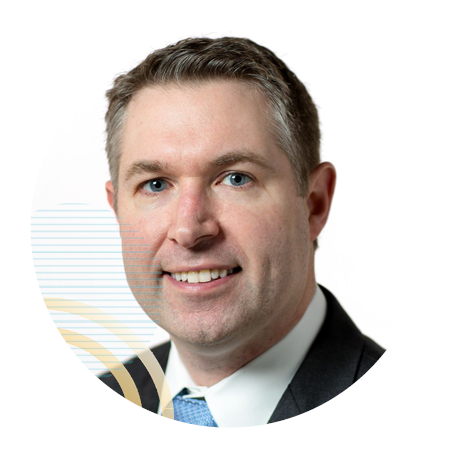PUTTING THE 'INTERNATIONAL' IN THE CERTIFICATE IN INTERNATIONAL CASH MANAGEMENT
 Jeff Block, Director of Treasury and Finance at Reinsurance Group of America, took on the Certificate in International Cash Management after finding the equivalent qualifications options in the U.S too broad. Here he talks to us about his experience and how the qualification now sets him apart from his colleagues stateside.
Jeff Block, Director of Treasury and Finance at Reinsurance Group of America, took on the Certificate in International Cash Management after finding the equivalent qualifications options in the U.S too broad. Here he talks to us about his experience and how the qualification now sets him apart from his colleagues stateside.
What does your current role entail?
 I am a Director of Treasury and Finance with Reinsurance Group of America, Incorporated (RGA) in Chesterfield, Missouri. I joined RGA two years ago and primarily oversee managing RGA’s foreign exchange trading and risk exposure, sourcing regulatory financing, and other special projects such as implementing cash and collateral management tools and techniques.
I am a Director of Treasury and Finance with Reinsurance Group of America, Incorporated (RGA) in Chesterfield, Missouri. I joined RGA two years ago and primarily oversee managing RGA’s foreign exchange trading and risk exposure, sourcing regulatory financing, and other special projects such as implementing cash and collateral management tools and techniques.
Why did you take this ACT qualification? What was your main objective?

I found the available treasury educational resources and certifications in the United States too broad. A banker I knew from my previous job told me about the Certificate in International Cash Management (CertICM) after he recently passed the exam. He knew I managed a complex international pooling structure and thought I might find the curriculum interesting. I reviewed the syllabus with my boss and we felt this was an ideal supplement for my professional development.
The level of detail that went into the CertICM was a shock. You cannot learn that level of detail in a webinar or single textbook. I found this very valuable because I wanted to take the concepts and explain them to others without relying on bank presentations. The CertICM teaches you how to “get under the hood.” I wanted to learn how other treasury organizations operated worldwide and see examples of the various techniques that were used.
Which specific areas of your job role will this qualification support?
 RGA has grown significantly over the past few years. I joined shortly after they implemented a treasury management workstation to help manage the workload and improve cash visibility. There are many opportunities to optimize our existing cash and implement/structure new policies as we unlock the potential of the workstation.
RGA has grown significantly over the past few years. I joined shortly after they implemented a treasury management workstation to help manage the workload and improve cash visibility. There are many opportunities to optimize our existing cash and implement/structure new policies as we unlock the potential of the workstation.
Are there particular areas of treasury/finance that this qualification helped you understand even better?
 I found the multilateral netting, cash pooling structures, and detail of clearing and settlement to be particularly useful. All are opaque subjects to grasp, so the deep dive into each enables me to confidently explain the concepts to others.
I found the multilateral netting, cash pooling structures, and detail of clearing and settlement to be particularly useful. All are opaque subjects to grasp, so the deep dive into each enables me to confidently explain the concepts to others.
What are the benefits of having professional qualifications to add to your CV/résumé?
 In the United States, CertICM is not well known, even to other treasury practitioners. However, there are line items on my resume that would not exist without my having studied the CertICM. In addition, I’m quick to point out the rigors of achieving this qualification exceed those of other treasury qualifications available in the USA.
In the United States, CertICM is not well known, even to other treasury practitioners. However, there are line items on my resume that would not exist without my having studied the CertICM. In addition, I’m quick to point out the rigors of achieving this qualification exceed those of other treasury qualifications available in the USA.
Do you hold any other professional qualifications? If so, how does it/do they complement your CertICM?
 I completed the CertFMM and CertITM exams over the past couple of years. The CertFMM was probably just as valuable as the CertICM. I was able to re-engineer how our Currency Risk Committee views global currency exposure using modelling concepts I learned from the course. The modelling methods for currency options and cross-currency interest rate swaps were also useful as we are frequently looking to mitigate currency risks to our organization. I’m very fortunate to work in an organization that allows me to draw on the knowledge gained from these different qualifications. Wrapping up the AMCT is in my crosshairs for 2017. I earned the CTP designation a couple of years before I started with the ACT.
I completed the CertFMM and CertITM exams over the past couple of years. The CertFMM was probably just as valuable as the CertICM. I was able to re-engineer how our Currency Risk Committee views global currency exposure using modelling concepts I learned from the course. The modelling methods for currency options and cross-currency interest rate swaps were also useful as we are frequently looking to mitigate currency risks to our organization. I’m very fortunate to work in an organization that allows me to draw on the knowledge gained from these different qualifications. Wrapping up the AMCT is in my crosshairs for 2017. I earned the CTP designation a couple of years before I started with the ACT.
What happens next in your career and how has this qualification helped?
 To support a recent initiative, I proposed a multilateral netting system using the exact technique taught to me by Michele Allman-Ward. I was able to effectively show how it would help reduce frictional FX costs, wire fees, and countless hours spent by our finance personnel managing intercompany invoices. If we have a successful implementation, I would like to take a greater role in our capital markets activities moving forward.
To support a recent initiative, I proposed a multilateral netting system using the exact technique taught to me by Michele Allman-Ward. I was able to effectively show how it would help reduce frictional FX costs, wire fees, and countless hours spent by our finance personnel managing intercompany invoices. If we have a successful implementation, I would like to take a greater role in our capital markets activities moving forward.
What were the benefits of being able to study online?
 I was a little nervous at first. I took one online course in graduate school and I hated it. However, my concerns were allayed after the initial kick-off call and after I had a chance to navigate the website. The tutors are very responsive. I enjoyed moving at my own pace, but the tutors were quick to point out where each person should be throughout the course. I have two small children so online studying made the process manageable.
I was a little nervous at first. I took one online course in graduate school and I hated it. However, my concerns were allayed after the initial kick-off call and after I had a chance to navigate the website. The tutors are very responsive. I enjoyed moving at my own pace, but the tutors were quick to point out where each person should be throughout the course. I have two small children so online studying made the process manageable.
